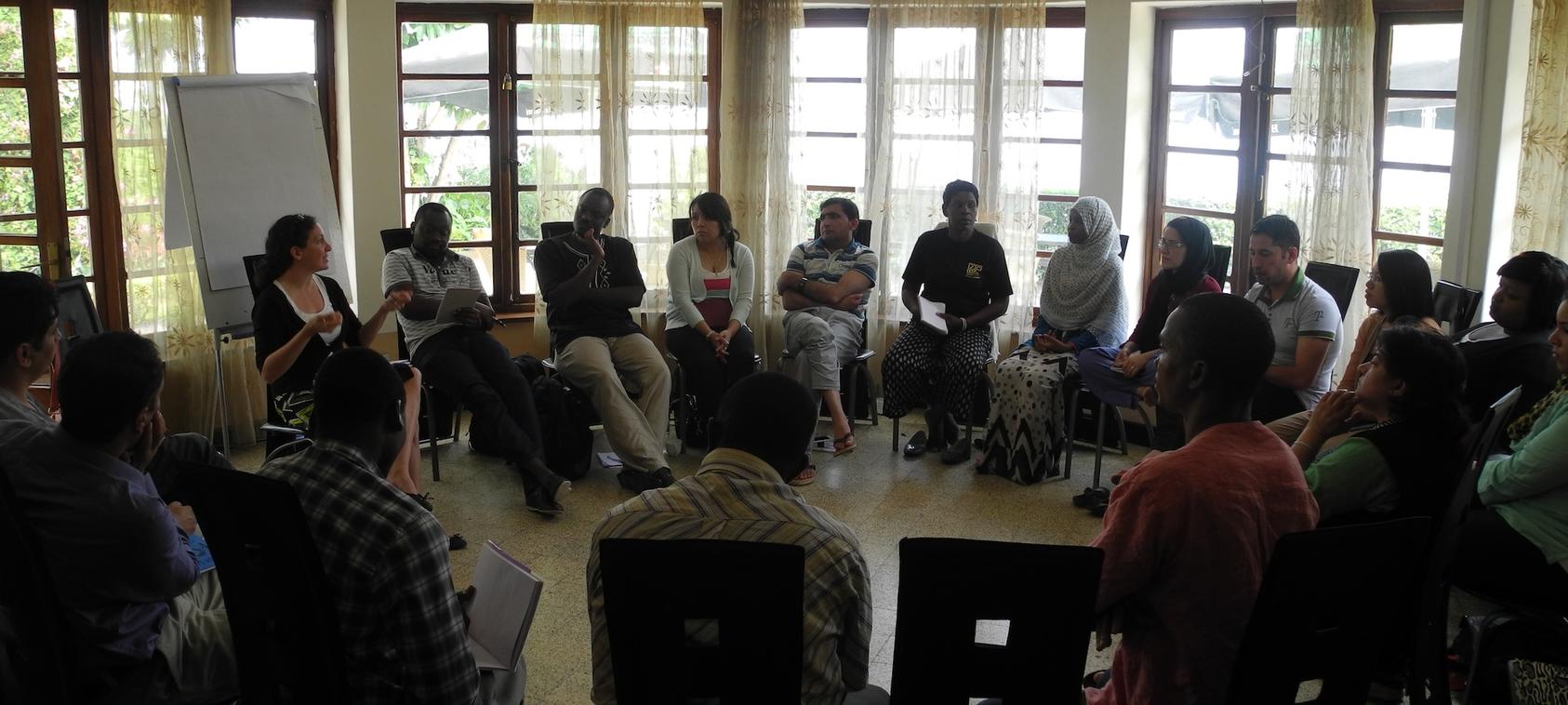Designing Community-Based Dialogue
This course introduces participants to dialogue as a practical and effective process for advancing conflict transformation and peacebuilding at the community level. The focus of the course is on designing and implementing a relevant, sustainable and meaningful dialogue process.

Course Overview
In communities that are adversely affected by social division or a history of violent conflict, strengthening relationships, improving understanding, and building interpersonal trust are key objectives toward restoring peace. Community members and leaders often know that to achieve these objectives, divided parties must engage with one another directly. But these direct engagements are frequently implemented as one-off, band-aid solutions, used as tools for one or more parties to pursue their own goals, or serve as a display of peace-making efforts without engaging stakeholders at all levels. Community-based dialogue can be a powerful mechanism for meaningful engagement, provided conveners, facilitators, participants, and other stakeholders have an informed understanding of what dialogue is and how to design and carry out a dialogue process. This course introduces participants to dialogue as a practical and effective process for advancing conflict transformation and peacebuilding at the community level. The focus of the course is on designing and implementing a relevant, sustainable, and meaningful dialogue process. Topics covered include:
- Definitions of dialogue;
- Principles that guide the community-based dialogue process;
- Considerations for designing, monitoring, and evaluating a dialogue process; and
- Stakeholders in a dialogue process – their roles and motivations.
Course Objectives
By the end of this course, participants will be able to:
- Distinguish dialogue from other conflict resolution processes;
- Determine when community-based dialogue is an appropriate process to manage a conflict; and
- Design a community-based dialogue process in their own geographical and social context.
*This course focuses exclusively on how to design and implement a dialogue process with stakeholders in a particular conflict context. It is not a course on how to facilitate dialogue. We at USIP strongly believe that facilitation should be learned through in-person training, where skills can be learned, practiced, and applied under the mentorship of experienced practitioners.*
Introductory Video
Agenda
Chapter 1: What is Dialogue?
This chapter introduces participants to the features of community-based dialogue that distinguish it from other types of group encounters. This chapter also explains how identity factors into a dialogue process, compares various dialogue models, and discusses which models might be appropriate for specific conflict situations.
Chapter 2: How do you Design a Dialogue Process?
This chapter identifies the key questions potential conveners want to ask in order to ensure that a community-based dialogue process is the right mechanism for addressing conflict, and that it is the right moment to hold one. It also guides participants through stages of designing a dialogue process, including analyzing the context and creating objectives.
Chapter 3: Who Are the Different Stakeholders in Dialogue?
This chapter outlines the three major roles individuals play in a dialogue process and explores how the guiding principle of inclusiveness relates to participant selection. In addition, this chapter explores the guiding principle of humanity as it relates to the contributions of the facilitator, and describes some characteristics of both facilitators and conveners in a dialogue process. Finally, this chapter evaluates the merits of self-selecting vs. nominated recruitment processes.
Chapter 4: How Does Learning Happen in Dialogue?
This chapter emphasizes the importance of learning in and from the community based dialogue processes. It introduces participants to considerations for monitoring and evaluation that are specific to community-based dialogue.
Instructors and Guest Experts
Course Instructors
- Alison Milofsky, Director of Curriculum and Training Design, U.S. Institute of Peace
- Ariana Barth, Associate Director, Arabella Advisors
Guest Experts
- Sireen Abu Asbeh, Project Officer, Arab Renaissance for Democracy and Development
- Yebelta Assefa, Peace Project Officer, Peace and Development Center
- Mark Brimhall-Vargas, Chief Diversity Office and Vice President for Diversity, Equity and Inclusion, Brandeis University
- Cate Broussard, Planning, Monitoring, Learning, and Evaluation Specialist, Life and Peace Institute
- Daryn Cambridge, Professional Development Portfolio Manager (EPIC), Training Resources Group, Inc
- Rhonda Fitzgerald, Managing Director, Sustained Dialogue Campus Network
- Tricia Homer, Senior Program Officer, U.S. Institute of Peace
- Tonis Montes, Program Officer, U.S. Institute of Peace
- Beatriz Montoya, Founder & Director, Asociación de Mujeres del Oriente Antioqueño
- Oussama Safa, Chief of Section, UN ESCWA
- Katherine Torres, National Coordinator, Puentes Para La Paz
- Hannah Tsadik, Representative for the Horn of Africa, Life & Peace Institute
- Timea Monique Webster, Facilitator, Words of Engagement Intergroup Dialogue Program
- Michael Zanchelli, former Program Officer, U.S. Institute of Peace


